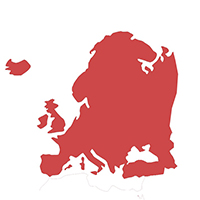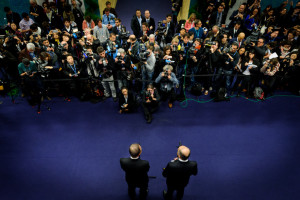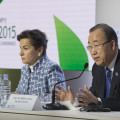State of Play: Out From The Shadows
Hamish M | December 11, 2015.
Six years, almost to the day, since the failure of the Copenhagen talks, agreement is beginning to emerge in Paris with a deal set to be sealed within hours.
Two weeks ago when opening the Paris climate talks, foreign minister and president of the conference, Laurent Fabius, declared that a final text must be produced several days before the conference close.
“If we take the usual procedure for negotiations”, he told delegates, “and we want to wait for the 11th hour and hope for a miracle, we do not have the right attitude”.
As the sun sets on what was meant to be the final day of the talks, the 11th hour has come and gone, and no consensus has been reached. But Fabius is not relying on miracles.
Last night, he introduced a new streamlined text, resolving some three hundred points of contention. Speaking to the media late last night, Australian Foreign Minister, Julie Bishop, and representative of the Umbrella Group of developed nations, said the text was a huge advance, declaring “we’re about 80% there.”
Tony de Brum, foreign minister from the Marshall Islands also welcomed the text, saying: “This text is a good attempt to work through some of the options toward finding landing zones. It forces countries to fight for what they really need to see in the final agreement”.
To finish the job, Fabius opened what he described as the final negotiation session, dubbed the ‘indaba for solutions’. The name said everything.
Indaba is a Zulu word for a meeting of warriors, and harks back to the South African city of Durban, the cultural heart of the Zulu people where at the 2011 climate conference, negotiations for a new global deal began.
The ‘solutions’ part was less obscure. Fabius signalled to the parties that the time for debate is over. There will be no more delays, the deal must be decided now.
This was one last masterstroke by Fabius, the seasoned diplomat who has already cemented his role in history as the architect of the Paris deal. He has given the talks the sense of finality they need. The journey from Durban will end tonight, and a new global climate regime will emerge.
But what that regime looks like remains to be seen.
There are still significant debates in the text. For one, the text leaves open two options for dealing with the now unstoppable impacts of climate change on the most vulnerable countries.
The first, described by one observer to this reporter as “diabolical” is silent on legal liability for developed countries to commit to compensation. The other would institute a wide-ranging set of strategies to help deal with irreversible climate change. Informal intelligence suggests that a ‘landing zone’ is close to being found on this language.
China, India, Venezuela and Saudi Arabia are known to be pushing to water down the text particularly on its long-term goal, and the frequency of reviews to national emissions reduction pledges. The developed nations, likewise, are playing hardball in finance. In short, the old rivalries are still playing out.
From here on in, the dealing takes place in secret. The Verb has heard that US Secretary of State, John Kerry, has today met privately with both Fabius, and then the Indian delegation. The White House has released a statement saying that Obama and Chinese President Xi Jinping are committed to finding an ambitious agreement over these final hours.
The few announcements that have been made in public have been made to packed rooms, with reporters desperate for any information. In a sign of building momentum, Brazil and Canada announced they have joined what is known as the ‘high ambition coalition’, a group of nations committed to the most ambitious possible outcome. In another room, a group of leading scientists slammed the latest draft text as “dangerous and deadly”.
But for the most part, the conference centre at Le Bourget is subdued, cameras lie idle and exhausted reporters sleep in corners. In these final hours, the action happens in secret, and much is still unknown.
The one thing that is for sure, is that behind the barricaded doors, agreement is emerging. And before long, it must come out of the shadows.














comment